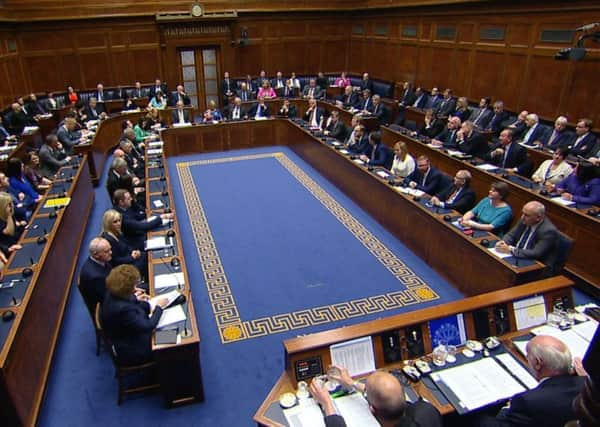Sam McBride: If deadlock follows the election, what then?


It was thus with the idea of an official Opposition at Stormont, a proposal put forward by many unionists since 1998 but most forcefully and most consistently by the TUV leader Jim Allister.
His hardline image meant that he was unlikely to ever convince nationalists that such a proposal was anything other than an attempt to return to unionist majority rule. In the end, it was the ultra-liberal unionist MLA John McCallister who succeeded in introducing legislation to provide for an official opposition.
Advertisement
Hide AdAdvertisement
Hide AdFor some time, Mr Allister has been floating another idea: direct rule and an Assembly.
It has received limited scrutiny – in part because of its source and in part because it seemed unnecessary to consider it in great detail when what appeared to be the most united Executive in more than a decade was in place.
Now, with the looming prospect of deadlock after next Thursday’s election (if the DUP and Sinn Fein stick to their positions) and no Stormont budget in a month’s time, there is an urgency to resolving how we will be governed, if not by a devolved Executive.
Sinn Fein, and to a lesser degree the SDLP, are calling for joint-authority – the British and Irish governments together administering Northern Ireland – as an alternative if the DUP and Sinn Fein cannot agree to share power.
Advertisement
Hide AdAdvertisement
Hide AdThat has been dismissed by the government and would be difficult to sustain under the terms of the Belfast Agreement, which states that Northern Ireland remains a part of the UK unless a referendum decides otherwise.
Given the imperative to have some sort of government in place, that appears to leave as the only viable alternative classic direct rule, such as that which existed during the Troubles, with an expanded NIO where several Conservative MPs act as government ministers overseeing the various departments.
Or maybe not, if Mr Allister is to be believed. He has proposed a variant of direct rule, whereby the Executive is made up of direct rule ministers, but the Assembly remains a legislative and scrutiny body.
Such a scenario would, he says, mean that we “retain local democratic control”. At the TUV manifesto launch last week, he conceded that the Executive (ie. the NIO) would have to have the ability to pass the budget over the head of the Assembly in order to avoid stasis.
Advertisement
Hide AdAdvertisement
Hide AdThe arrangement would be deeply problematic on many levels. The Assembly chamber would effectively become a single glorified opposition to the Executive where MLAs had power without responsibility.
Any unpopular proposals such as water charges, rate increases or prescription charges could be vocally opposed while MLAs also demanded further money for the health service.
It would also be difficult to persuade the SDLP and Sinn Fein to even participate in such a setup, given that it could be seen as legitimising direct rule.
A not dissimilar experiment was attempted in 1982. The so-called ‘Prior Assembly’ was boycotted from the start by nationalists.
Advertisement
Hide AdAdvertisement
Hide AdSinn Fein and the SDLP will be particularly suspicious about this proposal, given that it comes from Mr Allister who said at that time that if there was a choice between no devolved government and a power-sharing Executive with the SDLP “or other representatives of republicanism” he would have no problem foregoing a local executive.
Even Mr Allister could find that direct rulers pass laws – perhaps on gay marriage or abortion – which he abhors, unless the Assembly has an absolute veto on such legislation.
And yet, for MLAs of all parties there is a considerable personal carrot – money.
If classic direct rule returns, there will be scant justification for continuing to pay MLAs’ salaries and expenses. They may continue for a period, but MLAs – none of whom now have other elected roles to fall back upon – are in many cases in a financially vulnerable position if their positions go.
Advertisement
Hide AdAdvertisement
Hide AdAnd even republicans may be able to argue to their supporters that if direct rule is to be imposed by the government then they should be in the Assembly vigorously scrutinising what Tory ministers are doing, while they negotiate about restoring full devolution.
Such a scenario would please no one; but it might just please them all slightly more than all of the alternatives.